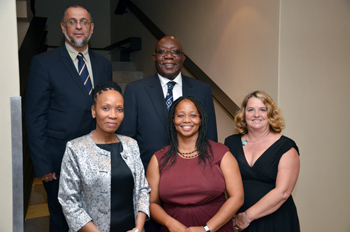Latest News Archive
Please select Category, Year, and then Month to display items
11 September 2024
|
Story Anthony Mthembu
|
Photo Anthony Mthembu and Chelsea Carolus
 From the left: Geraldine Lengau, Senior Officer in the Unit for Institutional Change at the UFS; and Oratile Reina, West College Prime.
From the left: Geraldine Lengau, Senior Officer in the Unit for Institutional Change at the UFS; and Oratile Reina, West College Prime.
As part of the initiatives lined up for College Week, the student leaders of West College at the University of the Free State (UFS) hosted a dialogue that primarily focused on discussing social justice as a value of Vision 130. The dialogue was held at Outeniqua Residence on 3 September 2024 and was well attended by students within West College.
According to Oratile Reina, West College Prime, “the motivation for the dialogue was to prepare newly elected leaders and our college community to align their efforts with Vision 130 – a vision that aims to create a more inclusive, equitable, and socially just environment on campus”. As such, she highlights that the dialogue was an opportunity for leaders to discuss practical strategies for implementing these values in their respective spaces, and to encourage those in West College to become better citizens inside and outside the university.
A conversation on social justice
The dialogue was facilitated by Geraldine Lengau, Senior Officer in the Unit for Institutional Change and Social Justice at the UFS. Lengau touched on several aspects pertaining to the topic of discussion. Firstly, she allowed the audience to give their definition of social justice, especially as students within the institution. In addition, she went on to talk to the audience about sexual assault in the context of social justice. In this instance, Lengau gauged whether the students knew which processes to follow in the event of a sexual assault incident, and whether they were acquainted with the UFS Sexual Harassment, Sexual Misconduct, and Sexual Violence Policy. Furthermore, the audience was given the opportunity to outline what social justice looks like to them in the spaces they occupy, including in their respective faculties, the sports they play, and the leadership structures they form part of. “I was encouraged to see that students take their right to a socially just university in very high regard, and that they were willing to break it down from what Vision 130 proposes, in order to align it with their common understanding,” said Lengau.
As the dialogue concluded, the audience signed a pledge committing to uphold the values of Vision 130. According to Reina, “The pledge represents a promise to take concrete steps towards fostering an inclusive and equitable campus culture. By signing the pledge, the leaders are not only agreeing to embody these principles in their leadership roles but are also holding themselves accountable to their peers and the broader university community.”
Twenty years of human rights - a call for reflection on the successes and challenges
2015-02-25

Back from the left are: Advocate Mohamed Shafie Ameermia, Commissioner, South African Human Rights Commission Advocate Lawrence Mushwana, Chairperson of the South African Human Rights Commission Front from the left are: Honourable Mahube Molemela, Judge President of the Free State High court and Acting judge of the Constitutional Court of South Dr Choice Makhetha, Vice-Rector External Relations, University of the Free State Prof Caroline Nicholson, Dean of the Faculty of Law, University of the Free State |
The South African Human Rights Commission (SAHRC), the Faculty of Law, and the Free State Department of Education hosted a gala dinner on 19 February 2015 to celebrate the launching of the Free State Provincial Division of the SAHRC, reaffirming their collaborative partnership, and confirming the commitment of the Free State Department of Education to community engagement, constitutional rights awareness, and youth advocacy.
The number of human rights abuses reported to the Human Rights Commission in recent years points to the complex nature of the challenges faced by South African communities. What is most disturbing is that the overwhelming majority of these offences are perpetrated by the youth, said Adv Lawrence Moshwana, Chairperson of the South African Human Rights Commission. “The Human Rights Commission is in need of support from government in order to be able to reach all provinces of South Africa”. The expansion of the commission’s services in the Free State and its partnership with the Provincial Department of Education is a great step towards protecting the rights of the most vulnerable communities.
Twenty years of human rights (read the full story)